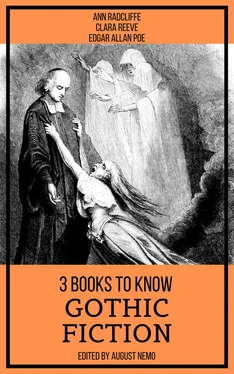1 ...6 7 8 10 11 12 ...22 The horn now sounded the signal for dinner, and interrupted the narrative of Madame. Her beauteous auditors wiped the tears from their eyes, and with extreme reluctance descended to the hall. The day was occupied with company and diversions, and it was not till late in the evening that they were suffered to retire. They hastened to madame immediately upon their being released; and too much interested for sleep, and too importunate to be repulsed, solicited the sequel of her story. She objected the lateness of the hour, but at length yielded to their entreaties. They drew their chairs close to hers; and every sense being absorbed in the single one of hearing, followed her through the course of her narrative.
‘My brother again departed without disclosing his sentiments; the effort it cost him was evident, but his sense of honor surmounted every opposing consideration. Louisa again drooped, and pined in silent sorrow. I lamented equally for my friend and my brother; and have a thousand times accused that delicacy as false, which withheld them from the happiness they might so easily and so innocently have obtained. The behaviour of the count, at least to my eye, seemed to indicate the satisfaction which this union would have given him. It was about this period that the marquis Mazzini first saw and became enamoured of Louisa. His proposals were very flattering, but the count forbore to exert the undue authority of a father; and he ceased to press the connection, when he perceived that Louisa was really averse to it. Louisa was sensible of the generosity of his conduct, and she could scarcely reject the alliance without a sigh, which her gratitude paid to the kindness of her father.
‘But an event now happened which dissolved at once our happiness, and all our air-drawn schemes for futurity. A dispute, which it seems originated in a trifle, but soon increased to a serious degree, arose between the Chevalier de Menon and my brother. It was decided by the sword, and my dear brother fell by the hand of my husband. I shall pass over this period of my life. It is too painful for recollection. The effect of this event upon Louisa was such as may be imagined. The world was now become indifferent to her, and as she had no prospect of happiness for herself, she was unwilling to withhold it from the father who had deserved so much of her. After some time, when the marquis renewed his addresses, she gave him her hand. The characters of the marquis and his lady were in their nature too opposite to form a happy union. Of this Louisa was very soon sensible; and though the mildness of her disposition made her tamely submit to the unfeeling authority of her husband, his behaviour sunk deep in her heart, and she pined in secret. It was impossible for her to avoid opposing the character of the marquis to that of him upon whom her affections had been so fondly and so justly fixed. The comparison increased her sufferings, which soon preyed upon her constitution, and very visibly affected her health. Her situation deeply afflicted the count, and united with the infirmities of age to shorten his life.
‘Upon his death, I bade adieu to my cousin, and quitted Sicily for Italy, where the Chevalier de Menon had for some time expected me. Our meeting was very affecting. My resentment towards him was done away, when I observed his pale and altered countenance, and perceived the melancholy which preyed upon his heart. All the airy vivacity of his former manner was fled, and he was devoured by unavailing grief and remorse. He deplored with unceasing sorrow the friend he had murdered, and my presence seemed to open afresh the wounds which time had begun to close. His affliction, united with my own, was almost more than I could support, but I was doomed to suffer, and endure yet more. In a subsequent engagement my husband, weary of existence, rushed into the heat of battle, and there obtained an honorable death. In a paper which he left behind him, he said it was his intention to die in that battle; that he had long wished for death, and waited for an opportunity of obtaining it without staining his own character by the cowardice of suicide, or distressing me by an act of butchery. This event gave the finishing stroke to my afflictions; — yet let me retract; — another misfortune awaited me when I least expected one. The Chevalier de Menon died without a will, and his brothers refused to give up his estate, unless I could produce a witness of my marriage. I returned to Sicily, and, to my inexpressible sorrow, found that your mother had died during my stay abroad, a prey, I fear, to grief. The priest who performed the ceremony of my marriage, having been threatened with punishment for some ecclesiastical offences, had secretly left the country; and thus was I deprived of those proofs which were necessary to authenticate my claims to the estates of my husband. His brothers, to whom I was an utter stranger, were either too prejudiced to believe, or believing, were too dishonorable to acknowledge the justice of my claims. I was therefore at once abandoned to sorrow and to poverty; a small legacy from the count de Bernini being all that now remained to me.
‘When the marquis married Maria de Vellorno, which was about this period, he designed to quit Mazzini for Naples. His son was to accompany him, but it was his intention to leave you, who were both very young, to the care of some person qualified to superintend your education. My circumstances rendered the office acceptable, and my former friendship for your mother made the duty pleasing to me. The marquis was, I believe, glad to be spared the trouble of searching further for what he had hitherto found it difficult to obtain — a person whom inclination as well as duty would bind to his interest.’
Madame ceased to speak, and Emilia and Julia wept to the memory of the mother, whose misfortunes this story recorded. The sufferings of madame, together with her former friendship for the late marchioness, endeared her to her pupils, who from this period endeavoured by every kind and delicate attention to obliterate the traces of her sorrows. Madame was sensible of this tenderness, and it was productive in some degree of the effect desired. But a subject soon after occurred, which drew off their minds from the consideration of their mother’s fate to a subject more wonderful and equally interesting.
One night that Emilia and Julia had been detained by company, in ceremonial restraint, later than usual, they were induced, by the easy conversation of madame, and by the pleasure which a return to liberty naturally produces, to defer the hour of repose till the night was far advanced. They were engaged in interesting discourse, when madame, who was then speaking, was interrupted by a low hollow sound, which arose from beneath the apartment, and seemed like the closing of a door. Chilled into a silence, they listened and distinctly heard it repeated. Deadly ideas crowded upon their imaginations, and inspired a terror which scarcely allowed them to breathe. The noise lasted only for a moment, and a profound silence soon ensued. Their feelings at length relaxed, and suffered them to move to Emilia’s apartment, when again they heard the same sounds. Almost distracted with fear, they rushed into madame’s apartment, where Emilia sunk upon the bed and fainted. It was a considerable time ere the efforts of madame recalled her to sensation. When they were again tranquil, she employed all her endeavours to compose the spirits of the young ladies, and dissuade them from alarming the castle. Involved in dark and fearful doubts, she yet commanded her feelings, and endeavoured to assume an appearance of composure. The late behaviour of the marquis had convinced her that he was nearly connected with the mystery which hung over this part of the edifice; and she dreaded to excite his resentment by a further mention of alarms, which were perhaps only ideal, and whose reality she had certainly no means of proving.
Читать дальше












